Doing Business in Vietnam: Complete Guide for Foreign Partners
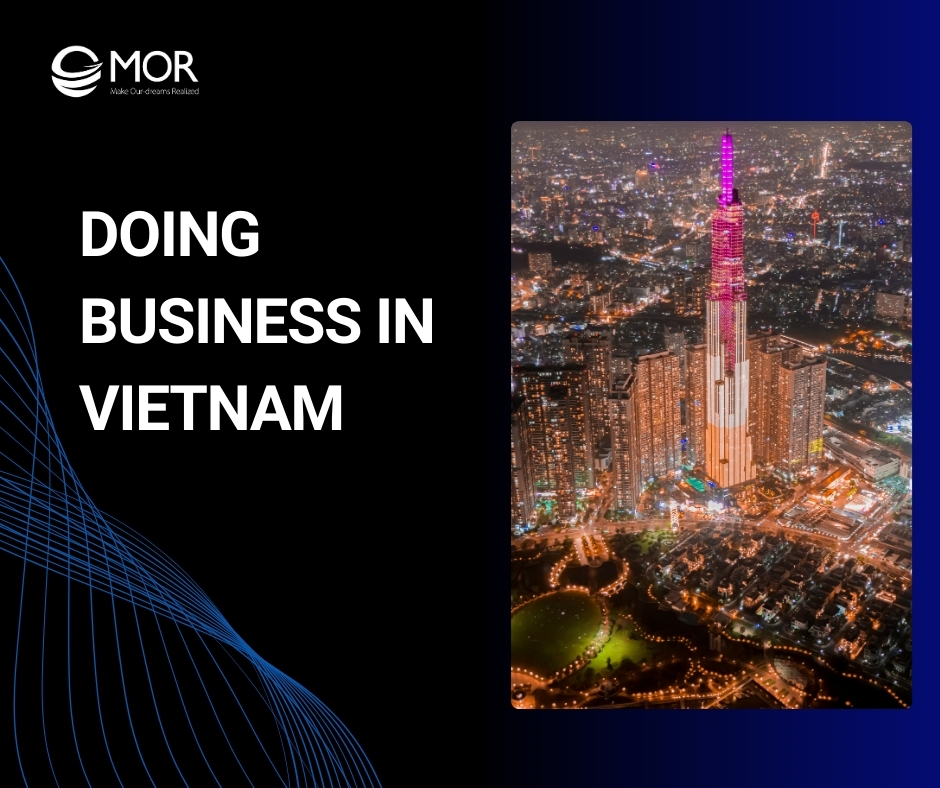
The appeal of doing business in Vietnam lies in its young workforce, strong exports, and expanding digital economy. Yet, challenges remain in regulations, costs, and cultural practices across the business of Vietnam. This MOR Software’s guide breaks down the essentials to help foreign partners move forward with confidence.
Overview Of Vietnam’s Economy And Growth Potential
Vietnam steps into 2026 with strong momentum. The country’s economy grew 7.09% in 2024, bringing GDP to around 476 billion dollars, supported by exports and rising foreign investment. Official reports also recorded the fastest quarterly growth in over two years during Q4.
Forecasts for 2025 remain optimistic, though ranges vary due to global trade uncertainties. The World Bank projects growth at 6.8% in 2025 and 6.9% in 2026, driven by manufacturing, exports, and services.
By contrast, the IMF’s Article IV consultation suggests growth may cool to 5.4% if U.S. tariffs remain in place, particularly hurting electronics and textiles. This highlights how export markets shape doing business in Vietnam.
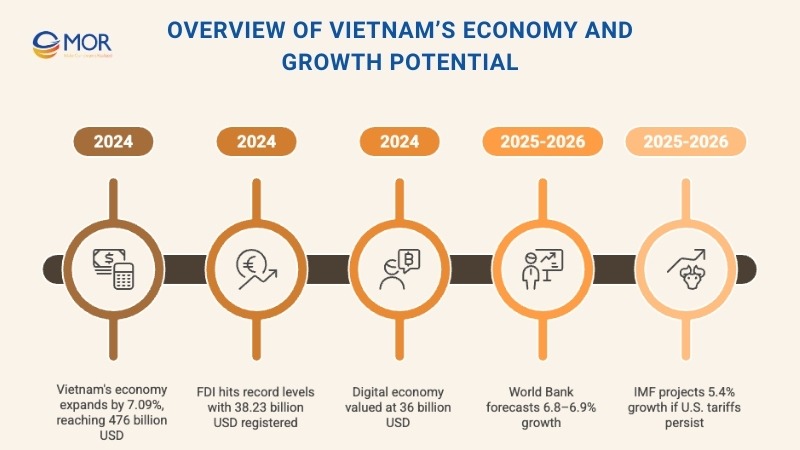
Foreign direct investment keeps fueling industrialization. In 2024, registered FDI reached 38.23 billion dollars, while actual disbursement hit a record 25.35 billion dollars. Processing and manufacturing accounted for two thirds of commitments, with Singapore, South Korea, China, Hong Kong, and Japan as leading contributors.
At the same time, the digital economy is accelerating. Based on the Google, Temasek, and Bain e-Conomy SEA 2024 report, Vietnam’s internet sector reached about 36 billion dollars in gross merchandise value for 2024, showing steady year-on-year expansion and stronger platform profitability.
This growth underscores the resilience of the Vietnam market entry strategy for both traditional industries and new digital opportunities.
Key Industries For Doing Business In Vietnam
Vietnam’s economy is powered by several core sectors that continue to attract investors worldwide. Exploring these industries reveals where the strongest opportunities for doing business in Vietnam can be found.
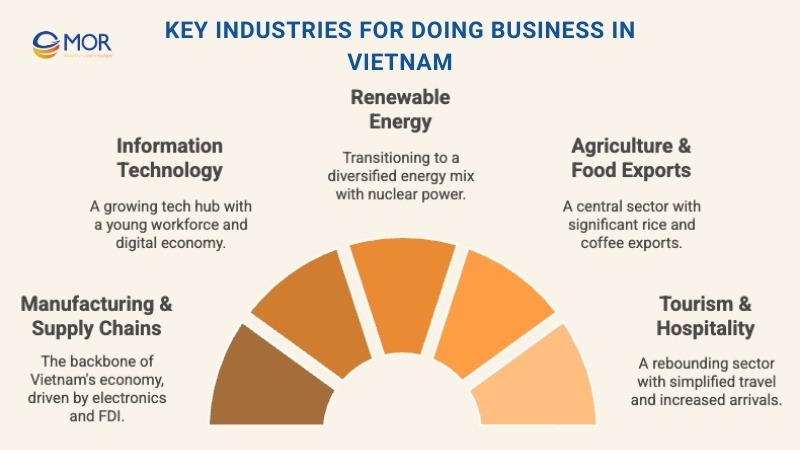
Manufacturing And Global Supply Chains
Manufacturing remains the backbone of doing business in Vietnam. The country has firmly established itself as a leading hub for electronics, smartphones, and related components, fueled by consistent foreign investment and ongoing supply chain shifts across Asia.
By the close of 2024, Vietnam posted strong export numbers and secured a large trade surplus with the United States, which continues to be its biggest overseas buyer.
Government figures underline this growth path. By the end of 2024, Vietnam counted more than 42,000 active FDI projects, with registered capital exceeding 500 billion dollars. Notably, the manufacturing sector attracted more than 66 percent of new foreign commitments that year, highlighting its central role in the Vietnam business ecosystem.
Information Technology And The Digital Economy
Vietnam is emerging as a leading destination for technology and services, supported by a young pool of engineers and rapidly expanding e-commerce.
According to the e-Conomy SEA 2024 study, the region’s digital economy reached 263 billion dollars in GMV during 2024, with Vietnam’s share climbing steadily on the back of strong online retail and the rise of short video-driven commerce.
This momentum is drawing the attention of global corporations. Reuters reported that Google is considering building a major data center near Ho Chi Minh City to meet cloud demand and strengthen the country’s digital expansion. Recent legislative changes now allow full foreign ownership of data centers, a significant step that signals new opportunities for hyperscale investors and underlines the potential of investing in Vietnam.
The pace of innovation here reinforces why global firms see long-term opportunities in doing business in Vietnam.
Renewable Energy And Power
Vietnam is advancing toward a cleaner energy mix while maintaining system reliability. Under Power Development Plan VIII, the government has laid out its roadmap for energy transition, which in 2026 reintroduced nuclear power as part of the long-term vision. The first reactors are targeted to be operational by 2035.
The strategy aims to diversify energy generation, cut coal dependency, and sustain the rising electricity needs of industrial growth. This balanced shift creates new opportunities for investors interested in doing business in Vietnam within the energy sector.
Agriculture And Food Exports
Agriculture continues to play a central role in the business of Vietnam. The country reached a new milestone in 2024 by exporting 9.04 million metric tons of rice, valued at 5.7 billion dollars. The Philippines remained the largest buyer, strengthening overall food trade revenues, though 2026 brings uncertainties with shifting demand and growing competition.
Coffee, particularly robusta, remains another key export. Vietnam holds the position of the world’s top robusta producer, and limited global supply pushed prices to multi-decade highs through late 2024 and early 2025.
Weather risks and ongoing tight supply conditions point to continued strength in robusta futures, further underlining agriculture’s importance to doing business in Vietnam.
Tourism And Hospitality
Tourism has staged a strong rebound. In the first half of 2025, Vietnam welcomed 10.7 million international visitors, marking a 21% year-on-year rise. Monthly arrivals even surpassed pre-pandemic figures at certain points, confirming the sector’s rapid recovery.
The government now grants 90-day e-visas to travelers from all nationalities, with both single and multiple entry options. This policy removes a key barrier for business travel and MICE activities, further strengthening Vietnam’s position as a destination that supports tourism growth and creates added value for those doing business in Vietnam.
The expanding hospitality sector also highlights the broader vn business environment, where tourism links closely with investment opportunities in services.
Why Vietnam Is Attractive For Investment
Vietnam continues to stand out as one of Asia’s most promising destinations for global investors. Several structural strengths make the country highly appealing for those interested in doing business in Vietnam.
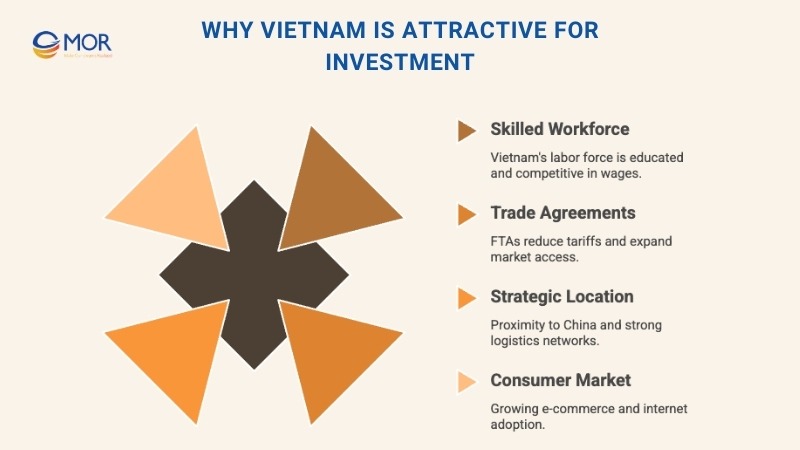
Large, Young Labor Force
Vietnam’s labor pool is large and increasingly skilled. The 2024 Investment Climate Statement recorded 52.4 million workers aged 15 and above, with strong literacy levels and more students entering higher education. For manufacturers and service hubs, this creates favorable conditions to expand quickly and sustain operations.
Wage costs also remain attractive compared to many ASEAN peers. The monthly minimum wage was adjusted in July 2024 and carried into 2025, now standardized across 34 provinces following administrative reorganization.
These regional wage brackets provide investors with a clear framework for payroll audit planning, making the labor force a strong draw for those doing business in Vietnam. This demographic advantage is often highlighted as one of the key advantages of doing business in Vietnam.
Trade Agreements And Market Access
Vietnam is part of one of Asia’s most extensive free trade agreement networks. Membership includes the Comprehensive and Progressive Agreement for Trans-Pacific Partnership, the EU-Vietnam Free Trade Agreement, the Regional Comprehensive Economic Partnership, and the UK-Vietnam FTA.
These deals lower tariffs, harmonize standards, and open procurement opportunities across major global markets. The Ministry of Industry and Trade provides the full list of active agreements and ongoing commitments, making them central to doing business in Vietnam.
This strong trade foundation highlights the benefits of doing business in Vietnam for global investors.
Strategic Location And Infrastructure Growth
Vietnam’s location gives it a natural edge. With a long coastline and close ties to southern China, the country serves as a prime base for suppliers seeking both China adjacency and diversification.
Key industrial zones near Ho Chi Minh City, Hanoi, Hai Phong, Bac Ninh, and Binh Duong link seamlessly to expanding deep-sea ports and airports. Public FDI disbursement data shows steady growth in factories and infrastructure, reinforcing Vietnam’s role in regional supply chains and the strength of the Vietnam economic system.
Growing Consumer Market And Internet Adoption
Vietnam’s domestic market is becoming increasingly important each year. In 2024, e-commerce gross merchandise value and platform profitability showed clear improvements, while authorities reported strong online spending across leading platforms.
This momentum drives growth in O2O retail, logistics, advertising, and digital payments. For foreign investors, the expanding consumer base and rising internet penetration add to the attraction of doing business in Vietnam, confirming the resilience and scalability of the local market.
Conditions For Doing Business In Vietnam
Setting up a company in Vietnam is relatively straightforward. Anyone over 18 years old who is not restricted from commercial activities can establish a business in any province without limitation. Except in unusual cases, individuals are free to create more than one enterprise, giving flexibility for those exploring how to do business in Vietnam.
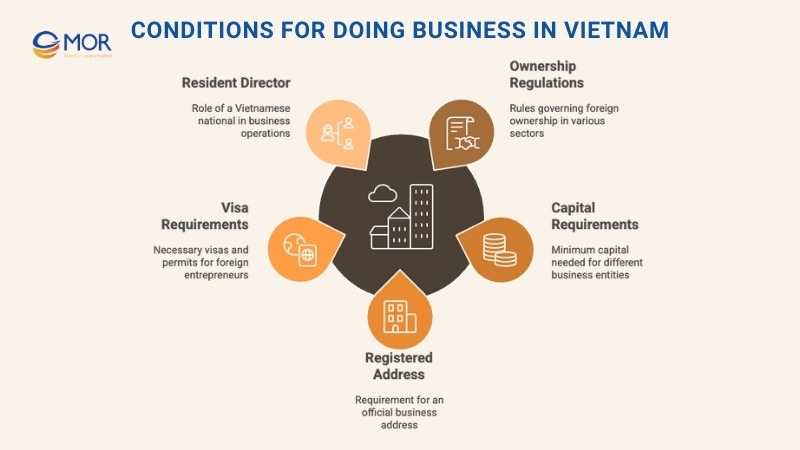
What Are The Requirements For Company Formation In Vietnam?
Before registering a company, it is important to understand the fundamental conditions that shape doing business in Vietnam. These rules cover ownership, minimum capital, registered address, visas, and management structure.
Foreign Ownership Regulations In Vietnam
Foreign investors are permitted to own up to 100 percent of a company in most industries. Certain sectors, including advertising, logistics, and tourism, apply restrictions where a local joint venture partner may be required.
International companies must also comply with World Trade Organization (WTO) agreements, which regulate ownership rights in many sectors. Where industries fall outside WTO or local regulations, approval from the relevant ministry is necessary.
These ownership rules remain a key factor when american companies doing business in Vietnam seek entry.
Minimum Capital Requirement For Doing Business In Vietnam
Capital requirements vary depending on the type of entity. For a limited liability company (LLC), the minimum is VND 10 million (about USD 440). A joint-stock company or foreign-owned enterprise (FOE) requires VND 30 million (around USD 1,320).
Certain industries, such as language centers, vocational schools, real estate, banking, insurance, and fintech, demand higher capital thresholds. Investors should plan accordingly, since capital adequacy can determine licensing approval.
Registered Address
Every company must have an official business address in Vietnam. This may be a leased office, a serviced office, or a registered virtual office. The location must be recognized by local authorities and listed in incorporation documents.
During registration, the Department of Planning and Investment may request proof of occupancy, which confirms the premises will be used for company operations.
Visa Requirements
Foreign entrepreneurs need the appropriate visa to register their enterprise. The type of visa depends on the legal entity: a work permit and investor visa for a foreign-owned enterprise, an investor visa for a joint-stock company, and a business visa for an LLC.
After securing the visa, applicants must obtain a temporary residence card to finalize company registration.
Resident Director
Every company must appoint at least one resident director. This role requires a Vietnamese national holding a valid ID card. The resident director oversees daily operations and ensures compliance with local legal requirements.
This position is critical for smooth company governance and long-term compliance in the Vietnam economic system.
The Cost Of Setting Up A Company In Vietnam
How much does it cost to begin doing business in Vietnam? The answer depends on the business entity you choose. Among all options, the limited liability company (LLC) remains the most common.
The average cost of forming an LLC is around 2,700 USD. This figure covers legal and accounting services, government filing fees with the national business registry portal, and the issuance of a Vietnam business registration certificate. These initial costs provide the foundation for legal operations within the vn business environment.
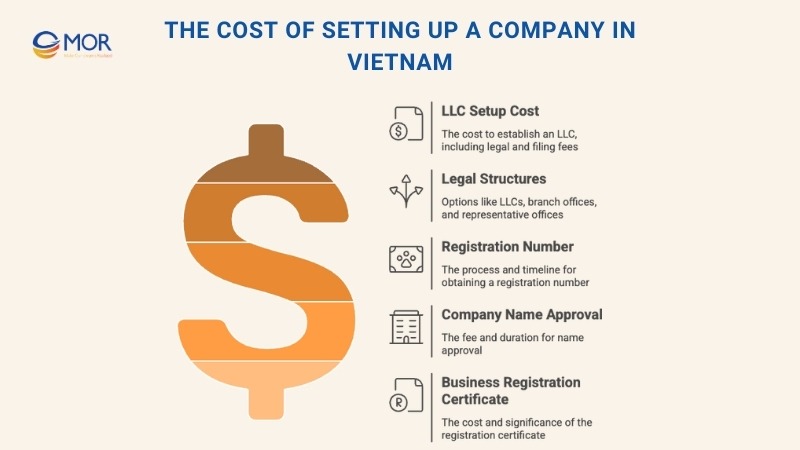
Legal Structures For Company Registration In Vietnam
Choosing the right legal structure is the next important step. Many investors prefer an LLC because it is relatively simple to establish and requires less complex reporting. Other available forms include branch offices and representative offices, which can be suitable depending on business goals and sector-specific requirements.
Company Registration Number In Vietnam
After selecting a structure, you must register with the national business registry. This process requires filing an application and securing your company registration number. Processing time varies by entity type but typically takes up to ten working days. Having this number is mandatory to continue doing business in Vietnam legally.
How To Register A Company Name In Vietnam
A company name must be chosen and filed with the national registry before incorporation. The application fee is about 50 USD, and approval usually takes around three days. Complexity or similarity of names may extend the timeline, so investors should prepare alternative options in advance.
Business Registration Certificate In Vietnam
Once the company name is approved, the next step is to apply for a business registration certificate. This official document verifies the legitimacy of the new enterprise.
The cost of this certificate generally falls between 100 and 300 USD, depending on the type of entity and the scale of the business. It marks the final step in confirming your company’s legal status and readiness for doing business in Vietnam.
A Step-By-Step Guide On Doing Business In Vietnam
Setting up operations in Vietnam requires following a clear process that aligns with local laws and regulations. Below is a structured roadmap that helps investors understand each stage of doing business in Vietnam.
Step 1: Register The Investment Registration Certificate
For foreign investors who want to officially begin doing business in Vietnam, the first legal requirement is obtaining an Investment Registration Certificate (IRC) from the Department of Planning and Investment. This certificate grants the permissions necessary for operations and validates the investment under Vietnamese law.
The application process usually takes about 30 days. In sectors not regulated under WTO agreements or local laws, the process can take longer, since approvals from one or more government ministries may be required. This is one of the early disadvantages of doing business in Vietnam, as additional steps and waiting periods may slow down market entry for certain industries.
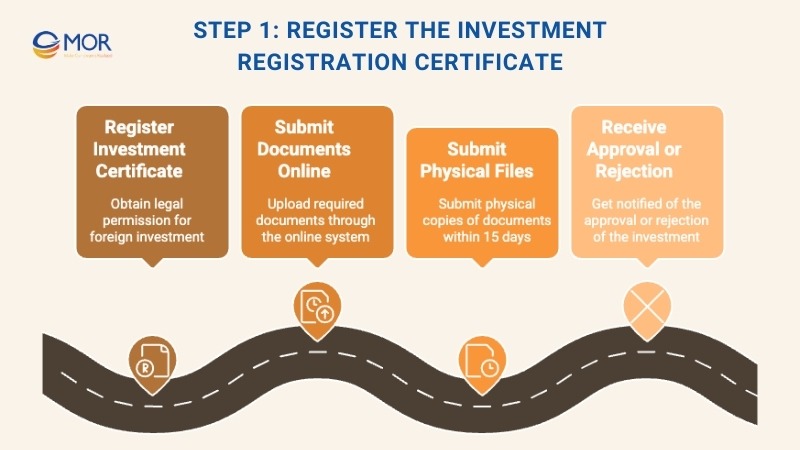
Business Registration Certificate
After receiving the IRC, investors must also apply for a Business Registration Certificate (BRC). This confirms the legal standing of the company and is essential for beginning formal operations.
Documents Of The Investor Needed For Setting Up A Company In Vietnam
When applying for the IRC, investors must prepare and submit the following:
No. | Type of Document | Quantity | Foreign Notarization | Consular Legalization | Requirement in Vietnam |
1 | Business license or certificate of establishment for institutional investors; Passport/ID card for individual investors | 02 | Required | Required | Must be translated into Vietnamese and notarized |
2 | Financial capacity proof: audited reports of the last 2 years, a commitment of support from parent company, a guarantee/commitment from a financial institution, or confirmation of bank account balance relative to planned capital | 01 | Required | Not required | Translation into Vietnamese and notarization are mandatory |
3 | Passport or ID card of the company’s legal representative in Vietnam | 02 | Required | Required | Must be officially translated and notarized in Vietnamese |
4 | Lease contract for office premises along with documents verifying the lessor’s right to lease (e.g., Land Use Right Certificate, Construction Permit, Business Registration Certificate with real estate function, or similar papers) | 01 | Not required | Not required | Notarization is compulsory |
5 | Passport of the legal representative of the institutional investor | 01 | Required | Required | Must be translated into Vietnamese and notarized |
Authority To Issue The Investment Registration Certificate
- For projects inside industrial parks, export-processing zones, hi-tech zones, or economic zones, the respective management boards are responsible for issuing, adjusting, and revoking the IRC.
- For projects outside these zones, the provincial Department of Planning and Investment is the issuing authority.
- If a project spans multiple provinces, the Planning and Investment Service where the investor plans to locate its headquarters must handle the application.
The Dossier For The Investment Registration Certificate
Investors must prepare a dossier that includes:
- A formal request to conduct the investment project.
- Proof of identity: ID card or passport for individuals, or certificate of establishment for organizations.
- An investment proposal detailing project objectives, capital, location, duration, labor demand, incentives requested, and expected socio-economic outcomes.
- Evidence of financial capacity, such as recent financial statements, bank guarantees, or parent company support letters.
- An office lease contract, with the landlord’s right to lease verified by relevant certificates.
- Land use approval from the government if state-owned land is leased or repurposed.
- For technology-related projects, documents showing the technology’s origin, process, and conditions of use if it falls under restricted lists.
- A business cooperation contract if the project is structured as a partnership.
Register For Your Investment Registration Certificate
Investors must first declare their project online through the National Foreign Investment Information System.
Within 15 days of the online submission, a physical file must be presented to the Investment Registration Authority. Once received, the investor is granted an online account to track progress and outcomes.
If approved, the system issues an official code confirming registration. If rejected, the authority provides written notice with clear explanations. This transparency helps investors better understand how the economic system Vietnam governs foreign entry and approvals.
Step 2: Register The Business Registration Certificate
After obtaining the Investment Registration Certificate, the next step in doing business in Vietnam is to officially register the enterprise. Investors can choose from several business structures, including:
- Limited Liability Company (LLC)
- Joint Stock Company (JSC)
- Partnership
- Sole Proprietorship
For an LLC, registration begins through the National Business Registration Portal, where investors must upload the required documents. This includes a copy of the Investment Registration Certificate and other legal papers relevant to the chosen entity.
Each company must have at least two founding members, who may be Vietnamese citizens or foreign investors with valid identification. Although in theory each founder can own up to 50%, foreign investors are typically limited to 49% ownership depending on sector rules and investment size.
The company’s name must also be submitted through the portal and approved by the Department of Planning and Investment. Once approved, the enterprise receives a Business Registration Certificate (BRC).
This certificate details the company’s name, registered address, and business code, confirming its legal standing in the business of Vietnam.
The registration process is generally straightforward if the dossier is complete, but processing may take from 7 to 30 days based on the complexity of the project. Costs also vary depending on the entity type and scale of the venture, adding to the calculation of the pros and cons of doing business in Vietnam.
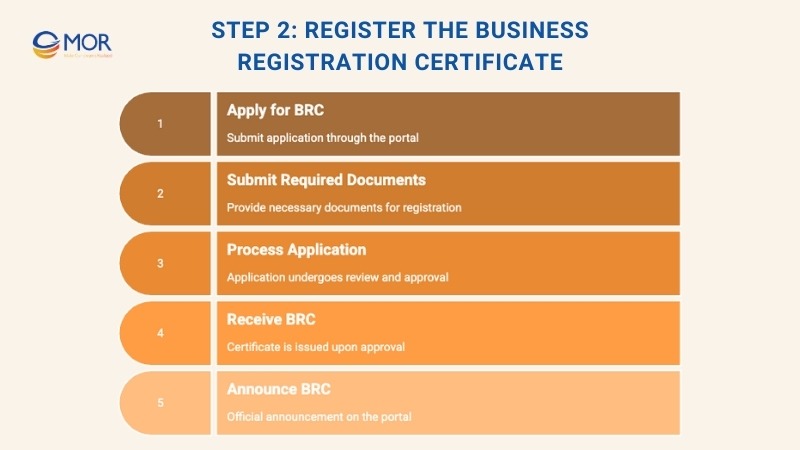
Required Dossier For Business Registration
To register, investors must prepare and submit the following documents:
- Completed business registration application form.
- The company charter.
- List of members (for LLCs) or shareholders (for JSCs).
- Certified copies of:
- Identity documents of individual members.
- Establishment decision, business registration certificate, or equivalent document of organizational members, plus authorization letters and ID cards of representatives.
- For foreign organizations, a legalized copy of the business registration certificate or equivalent document.
- The Investment Registration Certificate of foreign investors in line with the Law on Investment.
The dossier must be submitted to the National Business Registration Portal within three to five days. Once approved, the company is issued a BRC. Within 30 days of receiving this certificate, the enterprise is required to publish an official announcement on the same portal in compliance with regulations.
Step 3: Register The Business License For Conditional Business Lines
In certain cases, registering a company alone is not enough to begin doing business in Vietnam. Enterprises that engage in retail, education, or tourism must obtain additional licenses before starting operations.
Under Decree 09/2018/NĐ-CP, regulations govern trading activities for foreign investors and businesses with foreign capital. Retail is defined as selling goods directly to individuals, households, or companies for consumption.
While no license is required for export, import, or wholesale of items outside restricted categories such as petroleum, lubricants, rice, sugar, videos, books, newspapers, and magazines, a business license becomes mandatory when retailing through physical stores or commercial outlets.
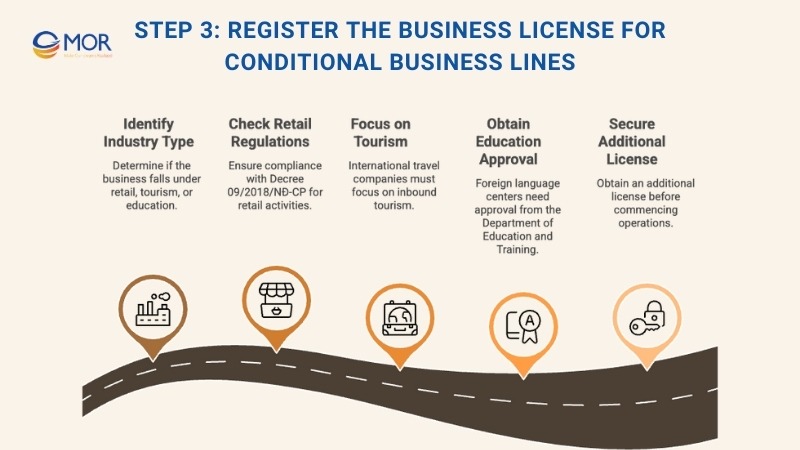
For investors wishing to operate inbound international travel services, their activities must focus exclusively on bringing foreign visitors into Vietnam. Only then will they be eligible for licensing.
Likewise, enterprises offering foreign language training must secure authorization from the Department of Education and Training during the Investment Registration Certificate process. Before starting operations, they must also apply for a license to run a foreign language training center through the same authority.
These additional steps illustrate how certain industries in the Vietnam economic system are more tightly controlled, requiring careful planning to avoid delays.
At the same time, they highlight the unique advantages of doing business in Vietnam, where regulatory clarity in sectors like retail, travel, and education provides structure for foreign enterprises entering the market.
Some Notes Before Doing Business In Vietnam
When preparing to launch a company, investors need to be mindful of several legal requirements. Following these rules ensures that the enterprise remains compliant, reputable, and sustainable over time. Understanding the following notes helps create a stronger foundation for long-term success when doing business in Vietnam.
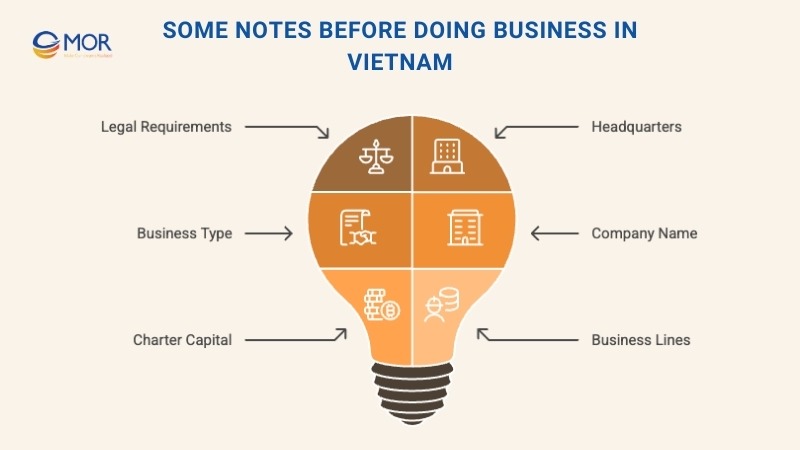
Note About The Company’s Headquarters
According to Article 42 of the Enterprise Law 2020, a company’s headquarters must be located in a stand-alone property and not in an apartment or multi-unit building. Investors who lease or borrow a property must sign a formal contract and request two certified copies of the landlord’s land use rights certificate.
This protects both the business and the owner, ensuring the location is legally valid.
To avoid complications, the company should always have someone available to receive notices from the tax office or business registry. If no contact is available, the authorities may classify the headquarters as inactive, which could lead to suspension of the business or tax codes.
Relocating to another district also requires closing all obligations with the former tax office before updating the registration.
The Type Of Business
The Enterprise Law 2020 provides different options for establishing a company. These include single-member limited liability companies, multi-member LLCs, joint-stock companies, sole proprietorships, and partnerships.
In practice, most foreign and local investors choose LLCs or JSCs, as they cover common needs while providing secure ownership structures.
The main distinction lies in capital and flexibility. A joint-stock company can raise funds from three or more shareholders and can trade shares on the market, which makes it attractive for businesses seeking growth. In contrast, LLCs offer tighter control with one to fifty members, where ownership changes are more restricted.
Although JSCs offer broader funding opportunities, their complexity requires stricter compliance, and mistakes in management may have serious legal consequences.
The Name Of The Company
Articles 37 to 41 of the Enterprise Law 2020 require that company names be unique. With thousands of new enterprises registered each year, finding a distinct name can be challenging. Adding specific prefixes or suffixes often helps.
Names cannot duplicate or include registered trademarks like Samsung, Honda, or Nokia, as this may result in forced name changes later. Investors should also ensure the chosen name is eligible for trademark protection and has an available domain, which strengthens brand recognition and digital presence.
The Charter Capital
Clause 34, Article 4, and Clause 2(c), Article 24 of the Enterprise Law 2020 state that companies are liable for their declared charter capital but are not required to prove its source at registration.
Owners should carefully decide the amount, taking into account project commitments, contract values, industry requirements, and related tax obligations.
Individuals must contribute capital within 90 days of receiving the Enterprise Registration Certificate. Contributions can be made by depositing funds directly into the company’s account. For organizations, contributions must be transferred through the business’s registered bank account, following Decree 222/2013/ND-CP and Circular 09/2015/BTC.
Increasing capital is relatively simple, while reducing it is more complicated and often requires meeting stricter conditions. To maintain fairness, all shareholders must contribute within the set period, and companies should carefully assess their funding needs before declaring the amount in registration documents.
The Business Lines
Decree 01/2021 states that companies may engage in any sector not explicitly prohibited by law. However, businesses must only operate within the fields they declare during registration. To maximize future flexibility, investors often select multiple relevant business lines from the beginning.
A key benefit under the current Enterprise Law is that companies do not need to provide practice certificates when registering certain business lines. This allows operations to expand more freely later.
Decision 27/2018/QD-TTg also requires enterprises to register industry codes up to Level 4 in the Vietnam System of Economic Sectors, ensuring proper classification of activities.
These notes highlight both the opportunities and the challenges of doing business in Vietnam. By preparing carefully, foreign partners can minimize risks and set their companies on a strong path to growth in the local market.
The Cost Of Doing Business In Vietnam
Starting and running a company involves a variety of expenses, from initial registration to ongoing operations. Below is a breakdown of the major cost elements that investors should prepare for when doing business in Vietnam.
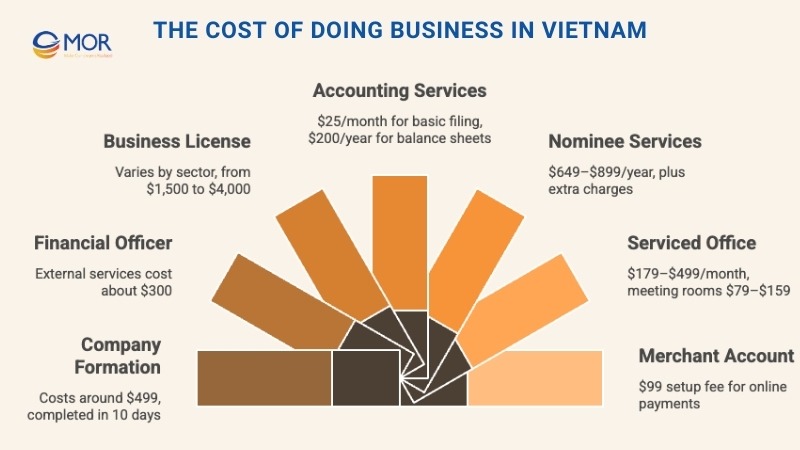
Vietnam Company Formation Fees
The upfront cost of incorporating a company usually begins around $499, with the process often completed within 10 working days. This fee typically covers incorporation, official documentation, and customer support throughout the process.
Unlike some jurisdictions, Vietnam does not require annual renewal fees, provided companies file their required tax returns on time. Many service providers also assist with tax compliance and provide a Financial Officer to help manage records.
Financial Officer
By law, every enterprise must appoint a Chief Accountant at the time of incorporation. Businesses may engage an external provider to fill this role, usually at a service fee of about $300. Companies retain the option to later replace this officer with an in-house employee as the business scales.
Business License Fees
Depending on the industry, specific licenses must be obtained before operations can begin. These licenses come with different costs:
- Service Company: $1,500
- Trading (Import & Export): $1,800
- Trading (Distribution): $2,200
- Manufacturing: $2,700
- Construction: $3,200
- Conditional Industry: $4,000
Open Bank Account Service Fees
Companies must also open a corporate bank account, with fees varying based on the bank and the type of services chosen. While relatively small compared to other expenses, this step is essential for proper financial management.
Tax, Accounting, And Auditing Service Fees
Maintaining compliance with tax rules is critical for anyone investing in Vietnam. Accounting service packages often include:
- Monthly/Quarterly tax filing – $25/month (10–20 invoices)
- Comprehensive reporting – $50/month (10–30 invoices) or $65/month (under 50 invoices)
- Annual balance sheet preparation – $200
Choosing the right package depends on the volume and complexity of company transactions.
Nominee Service Fees
Vietnam allows nominee services to protect investor privacy. Typical costs include:
- Nominee shareholder – $899/year
- Nominee director – $899/year
- Power of Attorney (POA) – $649
- POA notarized – $779
- Declaration of Trust – $649
- Declaration notarized – $779
- Apostille-certified POA – $899
- Courier fee – $150
Some of these services require notary or apostille certification, depending on the jurisdiction linked to the business.
Serviced Office Fees
Entrepreneurs who do not want to lease permanent premises can use serviced office options, which provide flexibility and professional addresses:
Virtual Office
- 3 months: $199/month
- 6 months: $189/month
- 12 months: $179/month
Dedicated Office Plan
- 3 months: $399/month/seat
- 6 months: $369/month/seat
- 12 months: $329/month/seat
Co-Working Plan
- Day pass: $29/person
- Visitor: $135/5 days
- Monthly common desk: $499/person
Meeting Room
- 1 hour: $79
- Half-day: $159
Merchant Account Fee
To process online payments, a merchant account application service can be arranged at around $99.
Company Renewal Fee
There is no official renewal fee for enterprises already incorporated, provided all tax obligations are met. This makes Vietnam a relatively cost-effective location for long-term operations compared to other emerging markets.
Understanding these expenses is essential for foreign investors assessing the pros and cons of doing business in Vietnam, as transparent cost planning helps avoid delays and ensures smoother market entry.
Working Culture And Business Etiquette For Doing Business In Vietnam
Understanding Vietnam’s professional culture is just as important as handling legal or financial procedures. Respect for hierarchy, relationship-building, and clear communication all shape how business is done, making cultural awareness a key success factor when doing business in Vietnam.
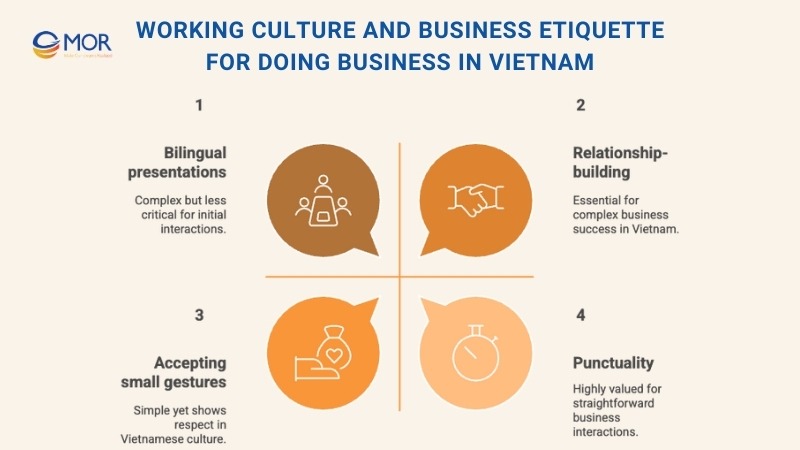
Relationships First
In Vietnam, successful business deals often begin with strong relationships. Meetings usually open with personal introductions and light conversation, allowing trust to build gradually.
Foreign investors are advised to be patient during the early stages of negotiation, as establishing credibility takes time. Spending effort on in-person engagement is highly valued in the Vietnam business environment.
Respect For Hierarchy
Seniority carries significant weight in professional interactions. Decision-makers should attend key meetings, and presentations are often expected in bilingual form to accommodate local partners.
Public disagreement with senior counterparts is considered disrespectful, so it is best to acknowledge hierarchy and show deference to official titles during discussions.
Punctual, Prepared, And Polite
Timeliness is crucial. Arrive on schedule, exchange business cards with both hands, and keep a courteous tone. Hardline negotiation tactics are generally frowned upon, as direct confrontation may harm long-term cooperation.
Instead, framing objections with constructive alternatives is more effective. Maintaining a respectful approach in meetings ensures smoother collaboration when doing business in Vietnam.
Communication Style
Clear communication helps bridge cultural and linguistic differences. Written follow-ups, bilingual meeting notes, and milestone trackers are often expected to keep projects on track.
Humor is acceptable but should remain professional. When offered tea or coffee during a meeting, it is polite to accept, as these gestures are part of building a positive working relationship.
By respecting these cultural practices, foreign investors not only avoid misunderstandings but also gain one of the key benefits of doing business in Vietnam: strong and lasting partnerships built on trust and respect.
Risks And Challenges To Watch When Doing Business In Vietnam
Even with its strong growth and investment appeal, Vietnam presents certain risks that investors need to plan for. Trade policies, infrastructure limits, and regulatory changes can all influence outcomes, so preparing ahead is essential for smooth operations when doing business in Vietnam.
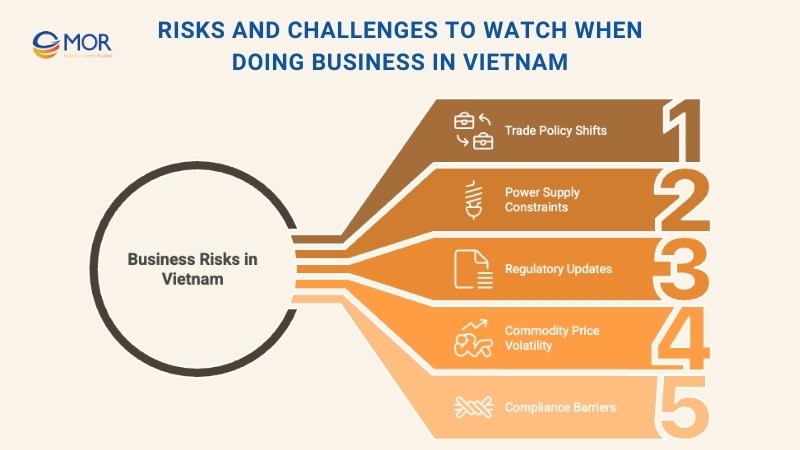
Trade Policy Shifts
Vietnam’s economy remains highly dependent on exports to the United States, with shipments in 2024 accounting for nearly 30% of GDP according to Reuters. This reliance exposes businesses to tariff risks.
By mid-2025, both governments were negotiating tariff caps of 20% for most goods and up to 40% for confirmed transshipment cases. Foreign companies, especially those in electronics, textiles, furniture, and agriculture, should prepare contingency plans to manage such exposure when doing business in Vietnam.
Power Supply And Grid Constraints
Energy reliability is another concern. Industrial parks in northern Vietnam faced power shortages and transmission bottlenecks in 2023, creating disruptions for manufacturers.
While the government’s Power Development Plan VIII and renewed nuclear power planning offer long-term solutions, factories must still plan for backup generation and adopt demand-response strategies in the short run.
Regulatory Updates
Vietnam continues to refine its legal and tax systems. The Corporate Income Tax law taking effect October 1, 2025 introduces new rates for SMEs and updates on offshore profit taxation. VAT relief has been extended through December 2026, but not all sectors qualify.
Additionally, the Personal Data Protection Law, effective January 1, 2026, will require businesses to update compliance procedures. Maintaining a clear compliance calendar is essential for foreign investors navigating the business of Vietnam.
Commodity Price Volatility
Key exports such as rice and coffee have faced significant price swings due to weather conditions and global supply issues, pushing values to multi-decade highs in late 2024 and early 2025. These shifts can compress profit margins for processors and exporters. Hedging strategies and diversified sourcing are advisable to limit risk.
Compliance And Localization Barriers
Certain sectors remain “conditional” for foreign participation, meaning investors face ownership limits or need additional licenses. Approval timelines for Investment Registration Certificates (IRC) and Enterprise Registration Certificates (ERC) may vary by province.
Engaging experienced local counsel can help navigate these challenges of doing business in Vietnam and ensure smoother market entry.
Action Checklist For Market Entry Into Vietnam
Setting up operations in Vietnam requires more than just legal paperwork. Investors should prepare a clear roadmap that covers structure, compliance, and relationship building to succeed.
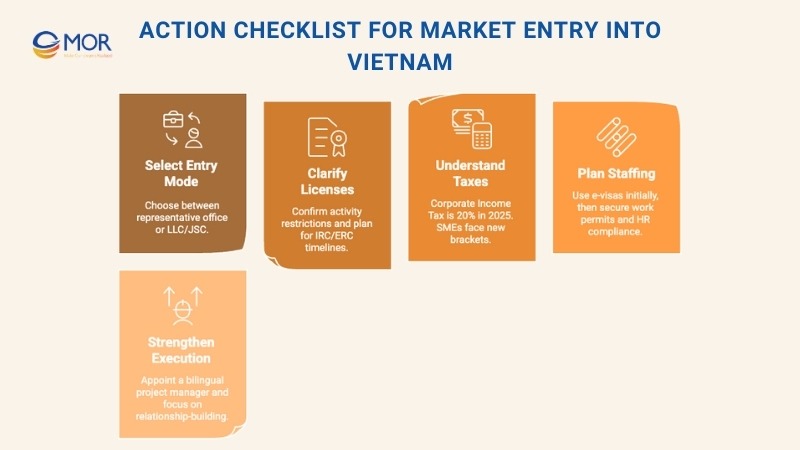
- Select the appropriate entry mode. Companies exploring the market without generating revenue can begin with a representative office, ideal for research and partner engagement. For full-scale operations, setting up a Limited Liability Company (LLC) or a Joint Stock Company (JSC) is the preferred option.
- Clarify licensing requirements early. Identify whether your intended business activities are unrestricted, conditional, or subject to foreign ownership limits. From there, schedule the timelines for obtaining the Investment Registration Certificate (IRC) and Enterprise Registration Certificate (ERC), or consider a share acquisition if you need a faster route into the Vietnam market.
- Understand the total tax structure. Corporate Income Tax (CIT) remains at 20 percent in 2025. Businesses should also assess eligibility for the extended 8 percent VAT scheme valid through 2026, and anticipate new SME tax brackets effective from October 2025. Additionally, factor in social insurance obligations and foreign contractor tax when calculating operational costs.
- Prepare for mobility and staffing. The 90-day multiple-entry e-visa is useful during the initial ramp-up. Once the business expands and staff numbers increase, ensure compliance with work permit requirements and HR procedures.
- Strengthen local execution and cultural fit. Appoint a bilingual project manager to coordinate weekly progress reviews and manage local approvals alongside infrastructure development. Focusing on relationship-building and cultural understanding will accelerate project timelines and reduce friction when doing business in Vietnam.
Conclusion
Doing business in Vietnam presents exciting opportunities for foreign partners, from its fast-growing economy to its dynamic consumer base. The advantages of doing business in Vietnam outweigh the risks when investors plan carefully and understand the legal framework. Still, the challenges of doing business in Vietnam such as compliance and cultural adaptation require reliable guidance. With the right strategies, foreign companies can maximize the benefits of doing business in Vietnam and achieve long-term growth. Contact MOR Software today to get expert support for every stage of your Vietnam business journey.
MOR SOFTWARE
Frequently Asked Questions (FAQs)
What are the most common business structures for foreign investors doing business in Vietnam?
Foreign investors often choose between Limited Liability Companies (LLCs), Joint Stock Companies (JSCs), Representative Offices, or Branch Offices, depending on their business goals and scale of operations.
How long does it take to set up a company when doing business in Vietnam?
On average, the process takes 30–45 days, including obtaining the Investment Registration Certificate (IRC) and the Enterprise Registration Certificate (ERC).
What industries offer the best opportunities for doing business in Vietnam in 2026?
Manufacturing, information technology, renewable energy, agriculture, and tourism continue to be the strongest growth sectors for foreign investors.
What tax rates apply to foreign companies doing business in Vietnam?
Corporate Income Tax (CIT) is generally 20%, though incentives or lower rates may apply for small-to-medium enterprises (SMEs) and priority sectors. VAT currently stands at 8% for eligible industries under an extension valid through 2026.
Are there restrictions on foreign ownership when doing business in Vietnam?
Most industries allow 100% foreign ownership, but some sectors, including logistics, advertising, and tourism, may require local partners or have equity caps.
What cultural practices should I know before doing business in Vietnam?
Relationships and hierarchy are highly valued. Respect for seniority, polite communication, and punctuality in meetings are key to building long-term trust.
Which trade agreements benefit companies doing business in Vietnam?
Vietnam is a member of major FTAs, including CPTPP, EVFTA, RCEP, and the UK-Vietnam FTA, giving investors preferential market access and reduced tariffs.
What are the main risks to watch when doing business in Vietnam in 2026?
Key risks include trade policy shifts with the U.S., energy supply challenges in the north, regulatory changes in tax and data protection, and commodity price volatility.
Rate this article
0
over 5.0 based on 0 reviews
Your rating on this news:
Name
*Email
*Write your comment
*Send your comment
1